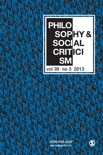
PHILOSOPHY & SOCIAL CRITICISM
Scope & Guideline
Challenging Norms, Inspiring Thought.
Introduction
Aims and Scopes
- Critical Social Theory:
The journal emphasizes critical social theory, particularly as it relates to power dynamics, justice, and democracy. It engages with the works of major theorists such as Adorno, Horkheimer, Foucault, and Habermas, exploring their relevance to contemporary social and political challenges. - Interdisciplinary Approach:
By incorporating perspectives from various disciplines—including political theory, sociology, ethics, and aesthetics—the journal fosters a multidisciplinary dialogue that enriches philosophical inquiry and social critique. - Engagement with Contemporary Issues:
The journal's scope includes a robust examination of pressing societal issues such as populism, racism, nationalism, and democratic governance, reflecting a commitment to analyzing the implications of these topics within a philosophical framework. - Historical Contextualization:
Many articles contextualize contemporary debates within historical frameworks, drawing connections between past philosophical ideas and current sociopolitical realities. This historical perspective aims to illuminate the evolution of thought and its impact on modern society. - Focus on Normativity and Ethics:
Explorations of ethical frameworks and normative theories are central to the journal's aims, with a particular focus on how these frameworks can guide social criticism and inform democratic practices.
Trending and Emerging
- Populism and Democracy:
A significant increase in discussions around populism and its implications for democracy illustrates a growing concern with how populist movements reshape political landscapes and challenge traditional democratic frameworks. This theme is increasingly relevant in light of global political shifts. - Racial and Social Justice:
There is a marked emphasis on racial and social justice, particularly in relation to critical race theory and intersectionality. This trend reflects heightened awareness of systemic inequalities and the need for philosophical frameworks that address these issues. - Digital Politics and Public Sphere:
The exploration of digital politics, including the impact of social media on public discourse and democratic engagement, has gained momentum. This emerging theme underscores the significance of technology in shaping contemporary political realities. - Environmental Ethics and Politics:
Increasing attention to environmental ethics and the political dimensions of ecological crises points to a growing recognition of the urgent need for philosophical engagement with climate change and sustainability issues. - Global Perspectives in Political Theory:
The journal is increasingly incorporating global perspectives into political theory, reflecting a commitment to diversifying philosophical discourse and addressing issues of globalization, colonialism, and transnational justice.
Declining or Waning
- Traditional Liberalism:
Discussions centered around traditional liberalism, particularly in its classical forms, have become less frequent. As contemporary critiques of liberalism gain traction, this theme appears to be overshadowed by more radical or alternative frameworks. - Metaphysical Speculation:
There is a noticeable decline in papers focusing on metaphysical speculation, particularly those that do not directly relate to social criticism or political implications. The journal's current trajectory favors more pragmatic and socially engaged philosophical discussions. - Eurocentrism in Political Theory:
The journal has gradually moved away from Eurocentric perspectives in political theory, reflecting a broader academic shift towards inclusivity and the incorporation of diverse voices and traditions. This decline indicates a growing recognition of the importance of global perspectives. - Purely Theoretical Discourse:
Papers that engage in purely theoretical discourse without application to practical social issues seem to be waning. The journal increasingly prioritizes works that connect philosophical ideas to real-world implications and social transformation.
Similar Journals

Pensando-Revista de Filosofia
Empowering Philosophical Inquiry and DialoguePensando-Revista de Filosofia, an esteemed publication by UNIV FEDERAL PIAUI, EDITORA, serves as a vibrant platform for philosophical discourse and exploration, anchoring its significance within the field of philosophy. With the ISSN 2178-843X, this journal aims to promote critical thinking and disseminate innovative ideas that advance the study of philosophical theories, contemporary issues, and interdisciplinary approaches. Although it currently operates under non-open access terms, researchers and scholars can look forward to insightful articles that contribute to enriching the philosophical landscape. The journal is nestled in Bom Jesus, Piauí, Brazil, and welcomes submissions that engage with both traditional philosophical frameworks and contemporary dilemmas, encouraging a diverse array of perspectives. With a commitment to academic rigor and an aim to inspire both professionals and students alike, Pensando stands as a crucial resource for anyone eager to deepen their understanding of philosophy and its relevance in today's world.
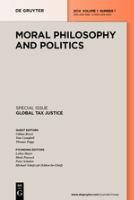
Moral Philosophy and Politics
Bridging Historical Philosophy with Modern ChallengesMoral Philosophy and Politics, published by WALTER DE GRUYTER GMBH, stands as a leading journal in the fields of ethical theory, political philosophy, and the social sciences. With an ISSN of 2194-5616 and an e-ISSN of 2194-5624, this journal provides a vital platform for interdisciplinary dialogue surrounding moral issues and political dynamics, particularly emphasizing the integration of historical philosophy with contemporary social issues. As a Q1 journal in both the History and Philosophy of Science and Philosophy categories for 2023, it demonstrates exceptional academic rigor and impact, solidifying its reputation within the academic community. Additionally, it holds significant rankings in Scopus, including #135 in Arts and Humanities (Philosophy) and #45 in Arts and Humanities (History and Philosophy of Science). The journal, which has been converging insights since its establishment in 2014 and will continue through 2024, is crucial for scholars and practitioners alike, enabling them to explore and contribute to the continuing discourse in moral and political thought. While the journal is not open access, it ensures broad dissemination of knowledge through its publication, affirming its importance as a reference point for ongoing research and philosophical inquiry. Located in Berlin, Germany, the journal addresses a global audience eager to engage with pressing ethical and political questions.

Beytulhikme-An International Journal of Philosophy
Navigating the Rich Tapestry of PhilosophyBeytulhikme-An International Journal of Philosophy is a distinguished publication dedicated to the exploration and dissemination of philosophical scholarship. Published by Beytulhikme Felsefe Cevresi, this journal serves as a platform for researchers, academics, and students to engage with contemporary philosophical discourses and historical inquiries. With its commitment to open access, Beytulhikme ensures that valuable philosophical insights are readily available to a global audience. The journal welcomes a diverse range of submissions, including theoretical papers, critical reviews, and interdisciplinary work that reflects the dynamic nature of philosophical research today. Located in Ankara, Turkiye, Beytulhikme plays a pivotal role in fostering a deeper understanding of philosophical concepts and methods, thus contributing to the academic community and enriching scholarly dialogue. As a key resource for professionals in the field, Beytulhikme not only encourages innovative thinking but also promotes a comprehensive examination of both Eastern and Western philosophical traditions.
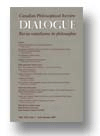
DIALOGUE-CANADIAN PHILOSOPHICAL REVIEW
Connecting Scholars Across Philosophical FrontiersDIALOGUE-CANADIAN PHILOSOPHICAL REVIEW, published by Cambridge University Press, stands as an esteemed platform in the field of philosophy, with a notable impact factor that reflects its scholarly contributions. Established in 1962 and extending its reach into 2024, this journal is indexed under ISSN 0012-2173 and E-ISSN 1759-0949. As part of its commitment to advancing philosophical discourse, DIALOGUE is ranked in the Q2 category for Philosophy in 2023, placing it among the top-tier journals in the discipline. Its Scopus ranking of #338 out of 806 highlights its critical role in shaping contemporary philosophical thought. The journal encourages robust discussions and critical analyses across various philosophical domains, appealing to researchers, professionals, and students alike. Although it does not offer open access, DIALOGUE enriches the academic community by providing valuable insights and fostering dialogue among philosophical scholars in the United Kingdom and beyond.

Claridades-Revista de Filosofia
Advancing Critical Engagement in Philosophical InquiryClaridades-Revista de Filosofia is a distinguished open-access journal dedicated to the exploration of philosophical thought and discourse, published by the ASOC PROMOCION FILOSOFIA & CULTURA MALAGA-FICUM. Since its inception in 2009, the journal has been committed to providing a platform for innovative philosophical research and insights, fostering engagement within the academic community and beyond. Based in the culturally rich city of Malaga, Spain, the journal caters to the diverse landscape of philosophical inquiry, with a focus on nurturing academic exchange globally. Although the journal currently holds a Q4 ranking in Philosophy according to Scopus, it aims to elevate its impact and contribute significantly to contemporary philosophical debates. Researchers, professionals, and students alike will find a wealth of thought-provoking articles and discussions that not only enrich their understanding of the discipline but also encourage critical dialogue about the pressing philosophical issues of our time. With its dedicated mission and open access model, Claridades is poised to be an essential resource for anyone invested in the vibrant and evolving field of philosophy.
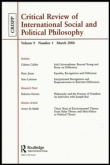
Critical Review of International Social and Political Philosophy
Illuminating Theories that Shape Our WorldThe Critical Review of International Social and Political Philosophy, published by ROUTLEDGE JOURNALS, TAYLOR & FRANCIS LTD, stands as a pivotal platform in the realms of philosophy, sociology, and political science. With an impressive Q1 ranking in Philosophy and a Q2 ranking in the Social Sciences sector for 2023, the journal is uniquely positioned to explore and critique contemporary issues through a philosophical lens. Although it does not currently offer Open Access, its esteemed reputation is evident in its Scopus rankings: 136th in Arts and Humanities and 610th in Social Sciences, reflecting its substantial impact in these fields. Covering a broad spectrum of topics, the journal invites contributions that delve into theoretical explorations and empirical studies, aiming to foster critical discussions that resonate in today’s sociopolitical landscape. Published in the United Kingdom, the journal continues to serve as an essential resource for researchers, professionals, and students seeking to deepen their understanding of social and political thought.

Phares-Revue Philosophique Etudiante de l Universite Laval
Cultivating Critical Engagement Among Emerging ScholarsPhares-Revue Philosophique Etudiante de l'Université Laval, ISSN 1496-8533, is a prestigious academic journal published by the Faculty of Philosophy at Université Laval, situated in the heart of Quebec, Canada. This journal serves as a vital platform for emerging scholars in the field of philosophy, showcasing innovative ideas, research findings, and critical discourse. As a crucial resource for researchers, professionals, and students alike, *Phares* encourages the exploration of diverse philosophical topics, promoting intellectual engagement and rigor. Although it currently does not provide open access, the journal's commitment to fostering a rich academic community remains paramount. With its high academic standards, *Phares* stands out as a significant contributor to scholarly dialogue, inspiring ongoing inquiry and discourse within the philosophical realm.

Ideas y Valores
Fostering Philosophical Discourse Across Latin AmericaIdeas y Valores is a distinguished academic journal published by the Universidad Nacional de Colombia, Facultad de Ciencias Humanas, focusing on the dynamic field of philosophy. Established in 1951, it has been a crucial platform for philosophical discourse in Latin America and widely accessible as an Open Access publication, promoting the free exchange of ideas. The journal addresses various philosophical themes, fostering interdisciplinary dialogue and enriching the academic landscape. With its ISSN 0120-0062 and E-ISSN 2011-3668, Ideas y Valores has been recognized with a Q4 ranking in the Scopus category of Philosophy, positioned within the 13th percentile among similar titles. Its contributions remain vital for researchers, professionals, and students seeking to deepen their understanding of philosophical concepts and engage with current debates. The journal's commitment to originality and relevance ensures it remains a pivotal resource within its field.

Topicos-Revista de Filosofia
Fostering Critical Thought and Global Philosophical DiscourseTopicos-Revista de Filosofia, published by UNIV PANAMERICANA, DEPT FILOSOFIA, stands as a significant academic platform within the field of philosophy, actively contributing to scholarly discourse since 2006 through its open access model. With an ISSN of 0188-6649 and an E-ISSN of 2007-8498, this journal is dedicated to fostering critical thought and philosophical inquiry in both regional and global contexts. Operating out of Mexico City, it provides a vital avenue for researchers, professionals, and students to engage with contemporary philosophical issues, reflected in its ranking of Q3 in the 2023 category for Philosophy and its position within the 33rd percentile among over 800 peer journals in the field according to Scopus. Topicos not only prioritizes accessibility to philosophical scholarship but also aims to propel academic discussions and elevate the standards of philosophical research. With coverage extending from 2013 to 2024, it invites contributions that bridge diverse philosophical traditions and innovative thought pathways, reinforcing its role as an influential resource for the philosophical community.
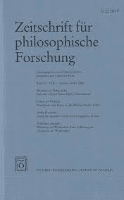
ZEITSCHRIFT FUR PHILOSOPHISCHE FORSCHUNG
Connecting Minds Through Thought-Provoking Philosophical Dialogue.ZEITSCHRIFT FUR PHILOSOPHISCHE FORSCHUNG is a prestigious academic journal published by Vittorio Klostermann GmbH in Germany, dedicated to the interdisciplinary field of philosophy. With its ISSN 0044-3301 and E-ISSN 1439-2615, this journal has made significant contributions to the philosophical discourse since its inception in 1977, continuing its pursuit of excellence in scholarship through 2024. Recognized in the 2023 category quartiles as Q2 in Philosophy, it is ranked #498 out of 806 in the Arts and Humanities' Philosophy classification by Scopus, placing it in the 38th percentile. Although it currently does not offer open access options, its rigorous peer-reviewed articles serve to enrich the scholarly community's understanding of complex philosophical issues. ZEITSCHRIFT FUR PHILOSOPHISCHE FORSCHUNG plays a vital role in advancing philosophical research in a collaborative academic environment, making it a valuable resource for researchers, professionals, and students alike.